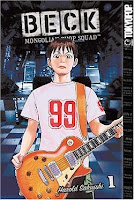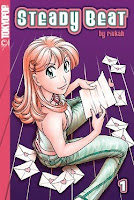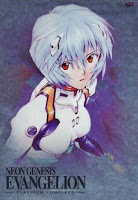My News and Reviews
Last week was the Osamu Tezuka Manga Moveable Feast, hosted by Kate Dacey at The Manga Critic. There was a good turn out this month. As for me, I managed to post two in-depth reviews related to the Feast. The first was Helen McCarthy’s Harvey Award-winning The Art of Osamu Tezuka: God of Manga. It’s a great introduction to Tezuka and his works, plus its a lot of fun to look at with hundreds of images. I also reviewed the first volume of Dororo, which is one of my favorite series by Tezuka.
I’ve added two new blogs that I enjoy to the Resources page, neither of which is specifically about manga but occasionally features a title: Nihon distractions: Readings in translated Japanese Literature and BookDragon, a part of the Smithsonian Asian Pacific American Program. I’d also like to point out a list of Yuri Manga Titles Available Outside of Japan put together by Erica Friedman over at Okazu. The list focuses on manga that is currently or will soon be in print.
I should probably mention that Experiments in Manga has been selected to compete in the second Aniblog Tourney. (I have no idea how they found out about me.) The first tournament focused on anime blogs, but this year manga-oriented blogs will be included as well. I’m mostly interested in learning about blogs that I don’t already know about through the tournament.
And as a complete side note, the fact that all of my manga quick takes for this week have something to do with boxing and/or wrestling was completely unintentional. However, now I really want someone to license Ashita no Joe. I tend to be particularly interested in karate since that is what I study, but I do enjoy series about martial arts and combat sports in general as well.
Quick Takes
 Gen, Issues 1-6 by Various. Gen is primarily touted as a digital manga magazine, but the issues are also eventually made available in print (which is how I read them). The magazine collects seinen indie and dōjinshi manga from Tokyo. There is a nice mix of stories: sports (boxing and sumo), comedy, drama, fantasy. I’ve never read a manga magazine before; I’ve always waited for a series to be collected. I am really enjoying Gen, though. I’ve been introduced to manga that I probably wouldn’t have thought to pick up otherwise. I only have one major complaint about Gen so far and that is that there is an overabundance of spelling errors in the translation. If I notice them, you know it’s bad.
Gen, Issues 1-6 by Various. Gen is primarily touted as a digital manga magazine, but the issues are also eventually made available in print (which is how I read them). The magazine collects seinen indie and dōjinshi manga from Tokyo. There is a nice mix of stories: sports (boxing and sumo), comedy, drama, fantasy. I’ve never read a manga magazine before; I’ve always waited for a series to be collected. I am really enjoying Gen, though. I’ve been introduced to manga that I probably wouldn’t have thought to pick up otherwise. I only have one major complaint about Gen so far and that is that there is an overabundance of spelling errors in the translation. If I notice them, you know it’s bad.
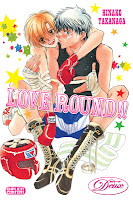 Love Round!! by Hinako Takanaga. I am fond of Takanaga’s work, and Love Round!! is no exception. It’s a silly little boys’ love one-shot, but is quite amusing and has likeable leads. Kubo is a high school boxing champion with dreams of going pro. His classmate, the effeminate looking Kaoru, turns out to be a flyweight powerhouse with a punch that can even knock out Kubo (and does so repeatedly). Kubo does his best to convince Kaoru to join his gym and the two end up becoming friends (and eventually a bit more). Kubo is a endearingly dense and his big mouth gets him into trouble on more than one occasion. Kaoru on the other hand, while cute, is a little spitfire. It’s easy to forget that they’re both high school students since most of the story takes place in the gym.
Love Round!! by Hinako Takanaga. I am fond of Takanaga’s work, and Love Round!! is no exception. It’s a silly little boys’ love one-shot, but is quite amusing and has likeable leads. Kubo is a high school boxing champion with dreams of going pro. His classmate, the effeminate looking Kaoru, turns out to be a flyweight powerhouse with a punch that can even knock out Kubo (and does so repeatedly). Kubo does his best to convince Kaoru to join his gym and the two end up becoming friends (and eventually a bit more). Kubo is a endearingly dense and his big mouth gets him into trouble on more than one occasion. Kaoru on the other hand, while cute, is a little spitfire. It’s easy to forget that they’re both high school students since most of the story takes place in the gym.
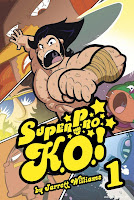 Super Pro K.O.! by Jarrett Williams. For a comic about professional wrestling, and despite Williams’ fun artwork, I actually found Super Pro K.O.! to be rather boring. This makes me sad, because I really wanted to like it. Maybe it’s just because I don’t have a particular interest in pro wrestling. I think that Williams was a little too ambitious for the debut volume. So many plot elements and characters were introduced that there wasn’t enough time to thoroughly develop any of them. I did like Joe Somiano, the supposed lead (I say supposed since he doesn’t appear much). Once a track star, he gave track up in order to pursue professional wrestling. He’s inexperienced and guileless, but very enthusiastic.
Super Pro K.O.! by Jarrett Williams. For a comic about professional wrestling, and despite Williams’ fun artwork, I actually found Super Pro K.O.! to be rather boring. This makes me sad, because I really wanted to like it. Maybe it’s just because I don’t have a particular interest in pro wrestling. I think that Williams was a little too ambitious for the debut volume. So many plot elements and characters were introduced that there wasn’t enough time to thoroughly develop any of them. I did like Joe Somiano, the supposed lead (I say supposed since he doesn’t appear much). Once a track star, he gave track up in order to pursue professional wrestling. He’s inexperienced and guileless, but very enthusiastic.
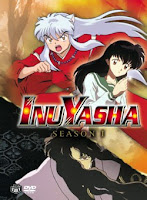 InuYasha: Season 1, Episodes 20-27 directed by Masashi Ikeda and Yasunao Aoki. It’s been a while since I watched the first part of the first season of InuYasha, but there’s enough recapping in each episode that I caught up pretty quickly. In fact, I feel that in general there’s too much recycling. While I’m sure it was useful when the series was being broadcast, it makes marathoning a bit of a slog since it slows down the pacing of the narrative. By the end of the first season, all of the main protagonists have been introduced as well as Naraku, the primary antagonist. I’m enjoying InuYasha, but at the same time I don’t really feel compelled to pursue the series, especially considering it’s length. Still, I’ll probably give the second season a try at some point.
InuYasha: Season 1, Episodes 20-27 directed by Masashi Ikeda and Yasunao Aoki. It’s been a while since I watched the first part of the first season of InuYasha, but there’s enough recapping in each episode that I caught up pretty quickly. In fact, I feel that in general there’s too much recycling. While I’m sure it was useful when the series was being broadcast, it makes marathoning a bit of a slog since it slows down the pacing of the narrative. By the end of the first season, all of the main protagonists have been introduced as well as Naraku, the primary antagonist. I’m enjoying InuYasha, but at the same time I don’t really feel compelled to pursue the series, especially considering it’s length. Still, I’ll probably give the second season a try at some point.
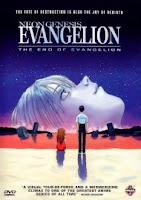 Neon Genesis Evangelion: The End of Evangelion directed by Hideaki Anno and Kazuya Tsurumaki. Long story short, The End of Evangelion is an alternate ending to the Neon Genesis Evangelion anime series, “replacing” the controversial final two episodes. Although there were parts of Neon Genesis Evangelion I really enjoyed, I think that to some extent I’ve lost my patience with the franchise. The End of Evangelion does explain some things that were not made explicitly clear in the original series, which I was very grateful for, but at the same time there are still parts that are terribly perplexing and there are still plenty of questions that have answers that are left up to interpretation.
Neon Genesis Evangelion: The End of Evangelion directed by Hideaki Anno and Kazuya Tsurumaki. Long story short, The End of Evangelion is an alternate ending to the Neon Genesis Evangelion anime series, “replacing” the controversial final two episodes. Although there were parts of Neon Genesis Evangelion I really enjoyed, I think that to some extent I’ve lost my patience with the franchise. The End of Evangelion does explain some things that were not made explicitly clear in the original series, which I was very grateful for, but at the same time there are still parts that are terribly perplexing and there are still plenty of questions that have answers that are left up to interpretation.
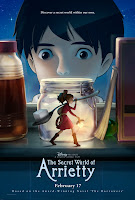 The Secret World of Arrietty directed by Hiromasa Yonebayashi. Based on The Borrowers, a series of childrens’ fantasy novels by Mary Norton, The Secret World of Arrietty is the most recent film from Studio Ghibli to be released in the United States. The story focuses on a family of small people known as Borrowers and a human who wants to befriend them. While the animation is beautiful, the garden and plants are particularly lovely, the pacing of the film very slow. I found myself paying more attention to the visual details of the world that was created rather than the actual story. I loved seeing how the Borrowers repurposed and used the items they found. My favorite part of the film was how liquids (tea, water, etc.) were handled as large droplets as opposed free-flowing fluids.
The Secret World of Arrietty directed by Hiromasa Yonebayashi. Based on The Borrowers, a series of childrens’ fantasy novels by Mary Norton, The Secret World of Arrietty is the most recent film from Studio Ghibli to be released in the United States. The story focuses on a family of small people known as Borrowers and a human who wants to befriend them. While the animation is beautiful, the garden and plants are particularly lovely, the pacing of the film very slow. I found myself paying more attention to the visual details of the world that was created rather than the actual story. I loved seeing how the Borrowers repurposed and used the items they found. My favorite part of the film was how liquids (tea, water, etc.) were handled as large droplets as opposed free-flowing fluids.

